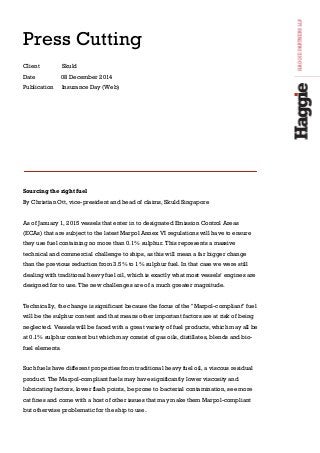
Christian Ott - Insurance Day - Dec 2014 - 2
- 1. Press Cutting Client Skuld Date 08 December 2014 Publication Insurance Day (Web) Sourcing the right fuel By Christian Ott, vice-president and head of claims, Skuld Singapore As of January 1, 2015 vessels that enter in to designated Emission Control Areas (ECAs) that are subject to the latest Marpol Annex VI regulations will have to ensure they use fuel containing no more than 0.1% sulphur. This represents a massive technical and commercial challenge to ships, as this will mean a far bigger change than the previous reduction from 3.5% to 1% sulphur fuel. In that case we were still dealing with traditional heavy fuel oil, which is exactly what most vessels’ engines are designed for to use. The new challenges are of a much greater magnitude. Technically, the change is significant because the focus of the "Marpol-compliant" fuel will be the sulphur content and that means other important factors are at risk of being neglected. Vessels will be faced with a great variety of fuel products, which may all be at 0.1% sulphur content but which may consist of gas oils, distillates, blends and bio- fuel elements. Such fuels have different properties from traditional heavy fuel oil, a viscous residual product. The Marpol-compliant fuels may have significantly lower viscosity and lubricating factors, lower flash points, be prone to bacterial contamination, see more cat fines and come with a host of other issues that may make them Marpol-compliant but otherwise problematic for the ship to use.
- 2. At the same time, the very low limit of 0.1% sulphur content is a challenge in itself, as it can be difficult to achieve and testing standards come with a margin of error which may mean fuel that is believed to be on spec is actually off spec. It will also be very easy to contaminate the same through unclean tanks and lines. Sourcing the right fuel, in sufficient quantities, managing fuel on board and planning voyages accordingly will also be part of the technical challenges faced by vessels. The commercial challenges arise from the higher cost of the low-sulphur fuel and the increased chance of disputes between shipowners and charterers over voyage planning, deviations, fuel consumption, available tank space and more. Over time it is expected shipping will be able to adjust and cope with the challenges from the ship side, be it technical or commercial, but whether ships will be able to get a consistently reliable supply of fuel that is not merely Marpol-compliant, but is otherwise suitable, is a bigger question and one which at present has an uncertain outlook. Claims, claims, claims Both hull insurers and protection and indemnity (P&I) clubs are already familiar with the myriad of claims that can arise from the supply and use of marine bunker fuels, typically when these are alleged to be off spec. These consequences can come at a very high price; a requirement for a new engine on an old vessel could essentially mean a constructive total loss. The significantly greater challenges concerning the use of 0.1% sulphur content fuel are likely to mean more claims will be faced in the future rather than less. Some of what can be expected to follow has already been demonstrated by the "Californian experience", where low-sulphur fuel was mandated as far back as 2009 and ultra-low-sulphur (0.1%) fuel became mandatory as of January 2014. A number of vessels suffered loss of propulsion on fuel switchover issues and these incidents led to further consequences resulting in direct and third-party indemnity claims. The kind of claims which may be experienced from marine fuel issues include: Hull •Engine damage due to off specification fuel
- 3. •Loss of power/propulsion •Collisions, allisions and groundings following a loss of propulsion P&I •Fines for alleged Marpol or local law violations •P&I liabilities arising from collisions, allisions and groundings Charterer’s liability to damage to hull •Indemnity claims for engine damage •Indemnity claims for loss of propulsion events •Indemnity claims for fines Freight, demurrage and defence insurance •Bunker quality disputes •Bunker supply contract disputes •Bunkering disputes, typically off hire but also others •Disputes over the vessel’s description and trading limits, especially in relation to available fuel tanks that can take the ultra low sulphur content fuel There will no doubt be other possible claim scenarios, too, and the above are just illustrative of the kinds of issues that can arise should actual or suspected off specification fuel be supplied to a vessel. Suffice to say there are a lot of ways marine fuel issues can lead to claims. The key to loss prevention is detailed preparation and that means ships are physically ready, crews are trained and educated, shoreside support is in place and commercial departments know what the new reality will bring with it. That is not a simple task of handing out a memo or having a meeting. Companies will need to ensure they engage in a rigorous review of their readiness to meet the challenges faced as of January 1, 2015. Christian Ott is vice-president and head of claims at Skuld Singapore Skuld has developed a detailed Guide for Low Sulphur Fuels, covering both regulatory as well as technical issues, and which can be accessed via Skuld’s website, www.skuld.com
